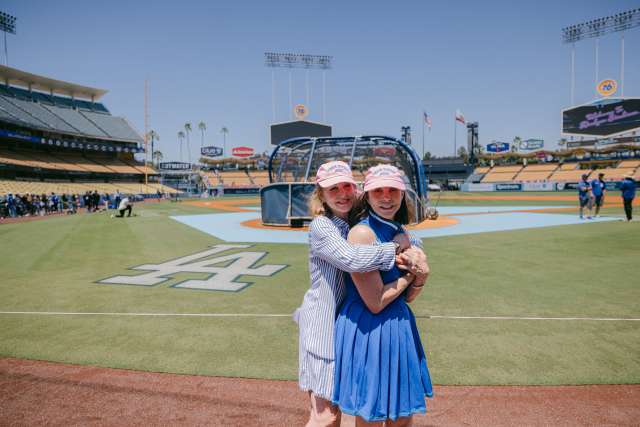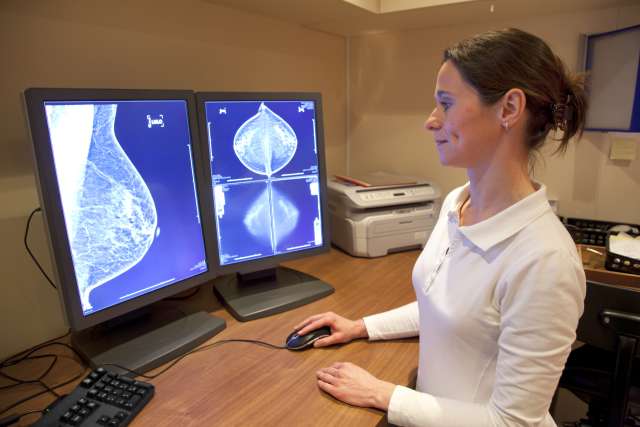Elisabeth Okun was diagnosed with ovarian cancer at age 62.
What started as seemingly a bladder infection had escalated into stage IVB ovarian cancer — the most advanced stage of the disease.
Her first reaction to the news? To protect her sister.
Thanks to her younger sister’s timely warning, Susan Ford Dorsey went on to discover that she, too, had early signs of the disease.
That unbreakable sibling bond was on display at Dodger Stadium, in late July, when Okun and Dorsey — who call themselves the “Fierce Sisters” — threw out the first pitch prior to a ballgame against the Boston Red Sox.
Their pitches were more than ceremonial — they marked a significant milestone in their battles with cancer and their commitment to promote ovarian cancer awareness.
The diagnosis
Okun, now 68, who is married and has two sons, first sought care at UCLA Health after experiencing pain while urinating and observing irregular spotting.
Despite minimal symptoms, Okun’s gynecologist conducted three ultrasounds. The third scan identified ovarian cysts, and a comprehensive full-body scan later disclosed cancer in her fallopian tubes, liver, bowel, chest cavity, peritoneum, and lymph nodes.
“It was shocking, because I was normally healthy,” says Okun.
Seeking expert treatment, Okun was referred to , the lead clinician for gynecologic oncology in the UCLA Health Department of Medicine and a member of the
Under Dr. Konecny's care, Okun underwent genetic testing, which prompted further investigation into her family’s genetic profile and her two siblings’ risk for the disease.
“She said to me and to our brother, you need to be tested,” says Dorsey. “So, we got tested right away, and I found out that both of us had the BRCA1 mutation.”
Learn more about Gynecologic Oncology services at UCLA Health
Mutations in the BRCA1 and 2 genes — which normally repair damaged DNA and function as tumor suppressors — raise the risk of breast, ovarian and other cancers. These mutations may be inherited or occur spontaneously in the body's cells.
While her brother underwent further precautionary screenings for the BRCA1 gene, Dorsey underwent prophylactic surgery, where the removal and analysis of her fallopian tubes and ovaries revealed “the very beginning of ovarian cancer.” This early detection was crucial.
“Patients diagnosed with stage I have a survival rate of approximately 90%, whereas those with advanced stages of the disease may have a five-year survival rate as low as 20-30%,” said Dr. Konecny.
“There is no consistent indication for ovarian cancer whatsoever,” explains Okun. “And so, I essentially was Susan’s early detection test.”
The treatment
At the outset, Dr. Konecny “told me to look beyond the statistics and recognize that science is moving at such a rapid rate,” says Okun.
He promised me that “there would be developments in medicine — and particularly at UCLA — that would prolong my life,” she explains. “So that gave me hope, number one, and so did the care surrounding me at UCLA.”
In addition to undergoing surgery and chemotherapy, Okun was one of the first patients to participate in a national clinical study involving a PARP inhibitor — a daily oral medication — combined with another maintenance therapy, Bevacizumab.
Participating in this study, which is co-authored by Dr. Konecny, was pivotal to Okun’s well-being as she maintained hope: New developments in ovarian cancer research were indeed becoming a reality at UCLA Health, just as Dr. Konecny predicted.
“What Dr. Konecny was talking about is actually coming through in terms of medical science,” says Okun. “And it’s very, very exciting.”

Okun and Dorsey are now cancer-free.
“UCLA did a great job in providing our treatment,” says Dorsey, who is 69 and a mother of one son. “Dr. Konecny and his team gave my sister hope by emphasizing that this was not a ‘death sentence,’ and the confidence that they inspired in her made all the difference in the world.”
Improving early detection
Dr. Konecny's current work at the aims to develop better systems for early detection, improving the lives of ovarian cancer patients.
Through a recent international collaboration, Dr. Konecny has designed a clinical trial to analyze blood samples from people with ovarian cancer before and after they receive treatment. The study is designed to detect specific DNA fragmentation patterns that could serve as indicators of ovarian cancer presence and treatment response. The research team is working in collaboration with Victor Velculescu, MD, PhD, and Jillian Phallen, PhD, at Johns Hopkins University, on development of the DNA fragmentation algorithm.
“DNA that comes from tumor cells looks very different and is more fragmented than normal DNA,” says Dr. Konecny. “So, when we look at fragments of DNA and study them, we can use artificial intelligence to detect patterns that are very typical for cancer cells.”
Dr. Konecny emphasizes that this is a “promising new technology” that is both cost-effective and precise in detecting ovarian cancer.
“We are planning to further improve the algorithm and move this into a larger, global screening study,” he says. “And this is the work that the Fierce Sisters are supporting that will benefit patients in the near future.”
Promoting early detection
Though they are cancer-free, the sisters’ journey with ovarian cancer is not complete.
Through their campaign, the two have garnered the support of their community to promote ovarian cancer awareness and Dr. Konecny's work. Their annual participation in the Los Angeles Half Marathon Charity Challenge enables them to raise money for ovarian cancer research, through the .
In addition to their fundraising efforts, the Fierce Sisters’ mission centers on the message that “early detection saves lives.”
“I want other women to know that there are no early detection signs, and there are no consistent symptoms for ovarian cancer,” explains Okun. “Early detection allows you choices and gives you options to help prolong your life.”
On a personal level, Okun and Dorsey also have discovered a newfound appreciation for their community — and for each other.
“The most gratifying part has been to see the friends that have surrounded Elisabeth and have stuck with us in the formation of the Fierce Sisters,” says Dorsey.
“That is the gift of cancer,” Okun adds. “Through the people who come to your aid, you recognize that you are indeed loved and do make a difference in the world.”
Both sisters are now screened twice a year and lead healthy, active lives.
“We are both strong women who are rebounding very well, and we’re looking forward to the next phase of our life,” says Dorsey. “This has been a huge part of the last seven years, but boy, we are so happy to be here. And we are so happy to be at this stage.”
And the sisters’ legacy continues to grow.
“The Fierce Sisters are not just the two of us,” Okun says. “It's all the people who have surrounded us — both men and women — and the medical team, who were so fierce. They believed with all their hearts that I could survive, and so, I believed as well.”




